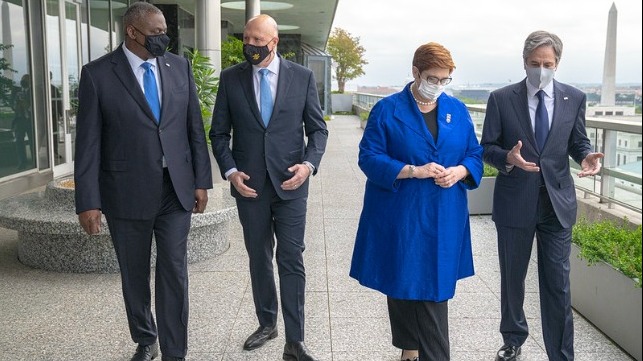Australia, U.S. Slam China's Maritime Traffic Safety Law

The U.S. and Australia have reaffirmed their commitment to the freedom of navigation in the South China Sea, describing China’s new controversial Maritime Traffic Safety Law as lacking any “legal basis."
In a joint statement after a meeting between their respective defense and foreign affairs secretaries in Washington, the two countries expressed concerns over China’s expansive maritime claims. The top officials called on China to implement its domestic legislation, including the Maritime Traffic Safety Law, in a manner consistent with the United Nations Convention on the Law of the Sea (UNCLOS).
“The principals reiterated their strong opposition to the militarization of disputed features and other destabilizing actions, including the dangerous use of coast guard and maritime militia, and efforts to disrupt other countries’ offshore resource exploitation activities,” said a joint statement.
The statement added that the U.S and Australia intends to strengthen cooperation and conduct maritime exercises with a wide range of partners in order to advance peace, security and prosperity in the Indo-Pacific region. They emphasized the "importance of countries’ ability to exercise their maritime rights and freedoms in the South China Sea, consistent with UNCLOS, including freedom of navigation and overflight."
China is facing a backlash after enacting a new maritime law that requires certain foreign vessels sailing into Chinese “territorial waters” to notify Beijing in advance. Article 54 of China's new Maritime Traffic Safety Law, which came into effect on September 1, requires advance notice from foreign submarines; nuclear-powered ships; ships carrying radioactive, toxic or hazardous materials; and any other vessels that "may endanger the maritime traffic safety" of China.
Beijing claims sovereignty over the vast majority of the South China Sea, including areas located hundreds of miles beyond the 12-nm limit accepted under UNCLOS. International observers have expressed concern that China could use its Maritime Traffic Safety Law to reinforce and legitimize its claims in the region.

that matters most
Get the latest maritime news delivered to your inbox daily.
The statement followed the announcement of a new UK-US-Australia defense cooperation partnership, dubbed "AUKUS," which will see Australia develop a fleet of nuclear-powered attack subs with British and American assistance. Though it is described as a way to deepen partnerships and ensure security in the Indo-Pacific, analysts say the program is aimed squarely at countering China's growing naval power.
"The nuclear submarine cooperation among the US, the UK and Australia severely undermines regional peace and stability, intensifies [the] arms race and undercuts international non-proliferation efforts. It’s highly irresponsible and shows double standards on using nuclear export for geopolitical games," responded Chinese diplomat Lijian Zhao.
